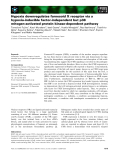
Disorders of homeostasis
-
Insulin is the principal regulatory hormone involved in the tight regulation of fuel metabolism. In response to blood glucose levels, it is secreted by the b cells of the pancreas and exerts its effects by binding to cell surface receptors that are present on virtually all cell types and tissues. In humans, perturbations in insulin function and/or secretion lead to diabetes mellitus, a severe disorder primarily characterized by an inability to maintain blood glucose homeostasis. Furthermore, it is estimated that 90–95% of diabetic patients exhibit resistance to insulin action....
 10p
10p  research12
research12
 01-06-2013
01-06-2013
 34
34
 4
4
 Download
Download
-
Farnesoid X receptor (FXR), a member of the nuclear receptor superfam-ily, has been shown to play pivotal roles in bile acid homeostasis by regu-lating the biosynthesis, conjugation, secretion and absorption of bile acids. Accumulating data suggest that FXR signaling is involved in the pathogen-esis of liver and metabolic disorders.
 14p
14p  vinaphone15
vinaphone15
 27-02-2013
27-02-2013
 28
28
 3
3
 Download
Download
-
Apoptosis or programmed cell death is an inherent part of the development and homeostasis of multicellular organisms. Dysregulation of apoptosis is implicated in the pathogenesis of diseases such as cancer, neurodegenera-tive diseases and autoimmune disorders. Tumour necrosis factor-related apoptosis-inducing ligand (TRAIL) is able to induce apoptosis by binding death receptor (DR)4 (TRAIL-R1) and DR5 (TRAIL-R2), which makes TRAIL an interesting and promising therapeutic target.
 13p
13p  mobifone23
mobifone23
 18-01-2013
18-01-2013
 41
41
 3
3
 Download
Download
CHỦ ĐỀ BẠN MUỐN TÌM















